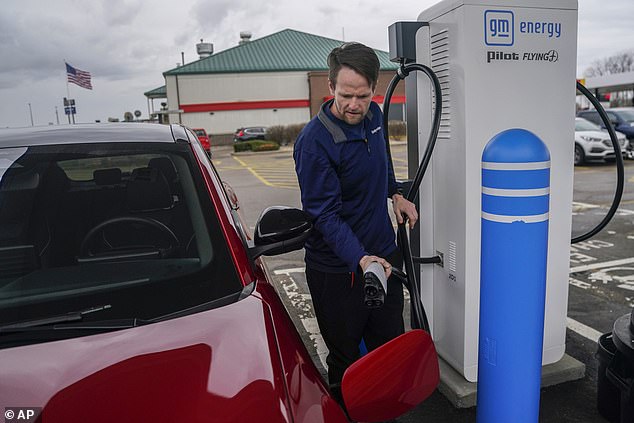Biden’s electric road to nowhere: Two years after he vowed to spend $7.5 billion building 500,000 charging stations only SEVEN have been plugged in
- There are currently only seven electric vehicle charging stations built with Bipartisan Infrastructure Law funds
- $5 billion was allocated to the National Electric Vehicle Infrastructure program
- The law says the charging stations must meet a certain standard and created a multi-step process before construction could begin
More than two years after President Joe Biden pledged to build 500,000 electric vehicle charging stations in the United States, only seven are operational in four states.
The Washington Post reported this on Friday The slow pace has meant that the allocated $7.5 billion in infrastructure funds has been exhausted.
The bulk of the money, $5 billion, will go toward building fast chargers along major highways — what’s called the National Electric Vehicle Infrastructure, or NEVI, program.
To meet the federal program’s requirements, chargers must be built at least every 50 miles along major highways and be operational 97 percent of the time.
They must also accept credit card payments and certain components must be done domestically.
More than two years after President Joe Biden pledged to build 500,000 electric vehicle charging stations in the US, only seven are operational in four states. The president is photographed arriving in Hagerstown on Friday for a weekend getaway at Camp David

Liam Sawyer of Indianapolis charges his 2023 Ford Mustang Mach-E earlier this month at one of the operational charging stations built with infrastructure bills. This is located in London, Ohio
In addition, states must submit proposals to the Biden administration for approval, solicit bids for construction and then award the funds.
So after the bipartisan infrastructure bill passed in November 2021, only seven charging stations are still operational.
They are located in Pennsylvania, Ohio, Hawaii and New York and offer 38 places where cars can be charged.
Twelve additional states have been awarded contracts to begin construction, while another 17 states have not even submitted proposals.
“I think a lot of people looking at this are concerned about the timeline,” Alexander Laska, deputy director for transportation and innovation at the center-left think tank Third Way, told The Post.
Nick Nigro, founder of Atlas Public Policy, told the newspaper that some of the delays are to be expected.
“State transportation companies are the recipients of the money,” he told The Post. “Almost all of them had no experience with deploying electric vehicle charging stations before the law came into effect.”
“I expect things to go much faster in 2024,” says Nigro.
If Republicans take back full control of Congress, as well as the White House, some of these programs could see a setback.
Biden’s challenger, former President Donald Trump, was openly hostile to the Democrat’s green agenda.
In mid-February, during a campaign stop in the state of Michigan, Trump said Biden had “ordered successful manufacturing in Michigan” with mandates to shift the U.S. auto industry away from gas guzzlers and toward electric cars.
And Republican lawmakers on Capitol Hill are not impressed either.
“We are deeply concerned that under your efforts, American taxpayer dollars are being woefully mismanaged,” read a letter a group of Republican representatives sent to the Biden administration in February.
“The problems with these programs continue to grow – delays in charger delivery, states’ concerns about labor contract requirements and minimum operating standards for chargers,” said the letter, which was signed by Republican Reps. Cathy McMorris Rodgers, Jeff Duncan and Morgan Griffith.
